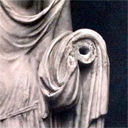0284 The Role of Antiquities between Fascist Italy and Nazi Germany
Diplomatic Gifting, Legal and Illegal Trades
Identifiers (Article)
Abstract
This article analyzes the antiquities trade between Fascist Italy and Nazi Germany in the construction of the two regimes’ diplomatic relationship before and during World War II. Both regimes made antiquities a medium of their political and ideological propaganda. During the delicate stages of their alliance in and after 1936, the Fascist regime, which considered itself the legitimate heir of the ancient Roman Empire, intensified the promotion of its role as a leading arbiter of cultural matters. A sense of Italian cultural superiority underlay the antiquities gifted or authorized for export to fulfill the Nazi leaders’ requests. Alongside this ‘legitimate’ trade, many other antiquities were illegally exported, sold, or stolen by art dealers, troops, and common citizens. Drawing on intense archival research conducted in Italian archives, the article presents different cases that shed light on the ways in which antiquities were manipulated for ideological and political purposes by the Fascist and Nazi regimes.
Statistics


License

This work is licensed under a Creative Commons Attribution-NonCommercial-NoDerivatives 4.0 International License.



